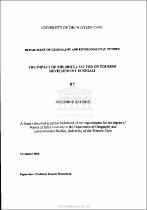| dc.description.abstract | The potential of tourism to contribute to economic growth in terms of increasing foreign exchange, creating employment opportunities, generation of government revenues, creating incomes, contribution to poverty reduction, acting as a catalyst of economic development and stimulation of investments have been advanced as the reasons for government support for tourism. It is against this background that countries in Africa such as Rwanda have implemented economic reforms such as privatisation and liberalisation in order to improve the investment climate. The main purpose of this study was to provide a detailed literature account of the tourism investment environment in developing countries, to examine opportunities, constraints and challenges of the hotel investors in Kigali, examine the role of government in
providing a conducive investment climate for hotel investors in Kigali and to investigate the impact of the hotel sector on tourism development in Kigali, Rwanda. Both qualitative and quantitative research methods were used to collect the data. Data were collected through questionnaires to hotel investors and interviews to government policy makers. Findings suggest that tourism can contribute to economic development of developing countries through its benefits. Much as investing in tourism has positive developmental
aspects to developing countries, tourism investment environment in developing countries has been constrained by various reasons such as inadequate financial institutions, constant political instabilities, lack of adequate tourism infrastructure, lack of human resource, small market size, poor tourism planning to mention but a few. Various investment opportunities are available in Rwanda. Progress in economic
performance, political stability, recognition of tourism as an engine of Rwanda's economic growth, the geographical location (in the centre) and the fact that tourism is still a virgin industry present important opportunities for potential investors in Rwanda's hotel sector. Despite the existence of investment opportunities, investors in Rwanda's hotel sector have faced problems such as the continued poor image of the country, lack of tourism infrastructure, the nature of the position of the country (land locked) lack of skilled personnel and lack of proper tourism information. The challenge for Rwanda is therefore to improve her image abroad that was formerly tarnished by the 1994 war and .
genocide. Improvement in infrastructure, human resource and proper methods of tourism information can also lead to improved investments in the tourism sector. Findings have further suggested that hotels in Kigali have indeed contributed to tourism development. Effects of the hotel sector have been noticed in urban tourism development, development of the tourism infrastructure in Kigali, creation of employment opportunities for the communities, generation of government revenues and contribution to poverty
alleviation. | en_US |

